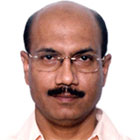You are here
Speaker Profile: Professor Sujit Dutta
 Professor Sujit Dutta, is the Mahatma Gandhi Chair at the Nelson Mandela Centre for Peace and Conflict Resolution, Jamia Millia Islamia, Delhi. Till May 2009 he was Senior Fellow and head of the East Asian Studies Programme at the Institute for Defence Studies and Analyses (IDSA). He is currently on lien from IDSA. His principal areas of research and studies are: Chinese politics, foreign and security policies, India-China relations, International Affairs in East Asia, India’s strategic thought, foreign and security policies, international conflict analysis. He has published a large number of research papers and chapters in books, and has edited the book India and the World: Strategic Thought—the Formative Years. Dr. Dutta has been a member of India-China Eminent Persons’ Group (2001-2005), and the National Security Council Task Force on China (2006-07), Council for Security Cooperation in the Asia Pacific Working Group on Confidence Building Measures (1994-1999). He was a Senior Fellow at the prestigious United States Institute of Peace, Washington D.C in 1997-98, and a visiting scholar at the Institute for National Defense Higher Education (IHEDN), Paris (2006). He has lectured and participated in conferences at a number of international think tanks and institutions and he has been interviewed extensively by international media and has extensively written in the print media.
Professor Sujit Dutta, is the Mahatma Gandhi Chair at the Nelson Mandela Centre for Peace and Conflict Resolution, Jamia Millia Islamia, Delhi. Till May 2009 he was Senior Fellow and head of the East Asian Studies Programme at the Institute for Defence Studies and Analyses (IDSA). He is currently on lien from IDSA. His principal areas of research and studies are: Chinese politics, foreign and security policies, India-China relations, International Affairs in East Asia, India’s strategic thought, foreign and security policies, international conflict analysis. He has published a large number of research papers and chapters in books, and has edited the book India and the World: Strategic Thought—the Formative Years. Dr. Dutta has been a member of India-China Eminent Persons’ Group (2001-2005), and the National Security Council Task Force on China (2006-07), Council for Security Cooperation in the Asia Pacific Working Group on Confidence Building Measures (1994-1999). He was a Senior Fellow at the prestigious United States Institute of Peace, Washington D.C in 1997-98, and a visiting scholar at the Institute for National Defense Higher Education (IHEDN), Paris (2006). He has lectured and participated in conferences at a number of international think tanks and institutions and he has been interviewed extensively by international media and has extensively written in the print media.
Abstract
South Asian Regional Security Architecture: Creating Order from Anarchy
The South Asian security environment is anarchic in both theoretical realist sense as well as a factual descriptive sense of the term. Though the region is civilisationally united, geographically contained within a discernible area, it is deeply divided politically and constitutes what Barry Buzan calls a ‘security complex’. Many of the states are still struggling to evolve a national identity and political form, and foreign policy is shaped by domestic politics. Internal conflict as a result is widespread, constitutional structures weak, and the polity is often deeply divided. Cooperation, trust and a shared vision among the elites in the region essential for constructing a regional order in such circumstances have therefore been difficult to attain. Self-help, security rivalry, and power balancing aimed at India — the central power that binds the region geographically — are pervasive. A security community based on an agreed normative order appears impossible to attain.
Yet joint efforts to construct a regional order can significantly enhance domestic stability, economic growth and external security for all the states as the European experience indicates. Clinching this argument among the region’s elites is the first challenge that needs to be overcome. There needs to be a strong normative order that binds the behaviour of all states in the regional context. Without a set of common democratic and collective security norms a successful regional order cannot be created. A domestic order based on democracy, secularism, federalism and welfare state is essential given the social, political and historical realities of the region. Such an order is necessary for constructing both stable and secure states, and facilitate the overcoming of a third challenge –the creation of a stable, cooperative regional order that evolves into a security community.
